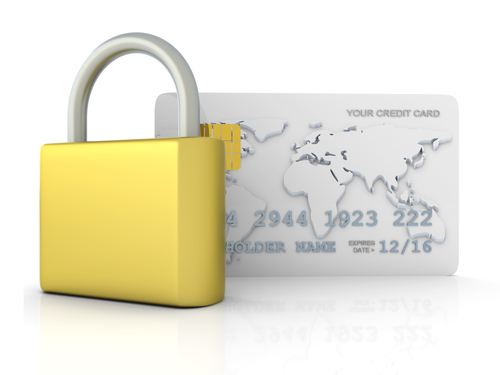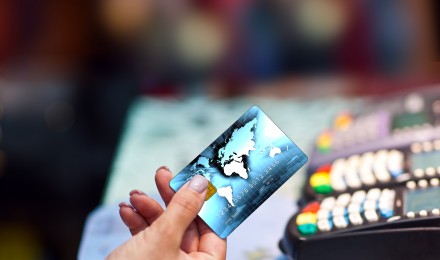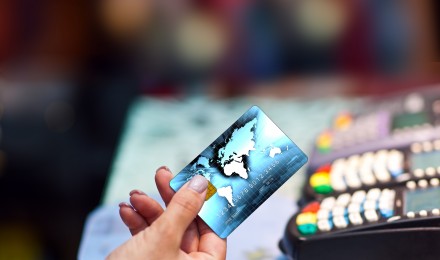The recent Global Payments credit card breach is the largest in two years, with hackers walking away with nearly 1.5 million credit card numbers.
Global Payments is a third-party company that processes payments for Visa and MasterCard worldwide. While the breach was limited to a handful of servers in North America, and Global Payments claims to have the situation under control, this remains a serious situation because credit card security breaches make consumers “six times more likely to become a victim of identity theft.” This is because thieves don’t necessarily need a Social Security number or home address to steal someone’s identity. They can use a credit card to purchase items and acquire a ton of debt in another person’s name.
If your credit card is ever involved in a security breach, you’ll receive a notice in the mail and you can ask your credit card company to watch your account for suspicious activity. But don’t rely on your credit card company to catch problems with your account. Here are a few steps that you can take when your account has been compromised.
Read Your Credit Card Statements
When cyber thieves steal a large amount of credit card numbers, they typically charge small amounts to these credit cards. This is how they fly under the radar. From a thief’s perspective, consumers aren’t likely to call their credit card company and complain about a $1 charge. In fact, some consumers won’t even notice such a small charge. Yet, if a thief steals 10,000 credit card numbers and makes a $1 transaction on each card, that’s $10,000 in stolen funds. After a security breach, keep a close eye on all of your statements and report any unauthorized transaction.
Request a New Credit Card
Even if you didn’t receive a letter about a security breach, it’s best to request a new credit card number if you suspect unusual account activity. You might receive emails regarding your credit card account or your credit card statement might not arrive in the mail. All are possible signs of identity theft. Thieves who steal your credit card number might send an emailing phishing for your online account username and password, and then change your account billing address once they have this information.
Check Your Credit Report
You have three credit reports, and after a credit card security breach, it’s imperative to stay on top of your personal credit report. Annual reports are free and you can request this information via telephone, in writing and online.
Reviewing your credit report is the best way to monitor your account after it’s been compromised. Credit reports list all accounts associated with your name and Social Security number. If a cyber thief maxes out your credit card or opens new accounts in your name, this information will appear on your credit report. You can then take steps to dispute fraudulent activity and remove this information from your report. But if you never check your report, fraudulent activity can stay on your record for years and lower your credit score.
Go to each of the three reporting bureaus (Experian, TransUnion and Equifax) to request one free report a year, or visit Annual Credit Report online.
The recent Global Payments credit card breach is the largest in two years, with hackers walking away with nearly 1.5 million credit card numbers.
Global Payments is a third-party company that processes payments for Visa and MasterCard worldwide. While the breach was limited to a handful of servers in North America, and Global Payments claims to have the situation under control, this remains a serious situation because credit card security breaches make consumers “six times more likely to become a victim of identity theft.” This is because thieves don’t necessarily need a Social Security number or home address to steal someone’s identity. They can use a credit card to purchase items and acquire a ton of debt in another person’s name.
If your credit card is ever involved in a security breach, you’ll receive a notice in the mail and you can ask your credit card company to watch your account for suspicious activity. But don’t rely on your credit card company to catch problems with your account. Here are a few steps that you can take when your account has been compromised.
Read Your Credit Card Statements
When cyber thieves steal a large amount of credit card numbers, they typically charge small amounts to these credit cards. This is how they fly under the radar. From a thief’s perspective, consumers aren’t likely to call their credit card company and complain about a $1 charge. In fact, some consumers won’t even notice such a small charge. Yet, if a thief steals 10,000 credit card numbers and makes a $1 transaction on each card, that’s $10,000 in stolen funds. After a security breach, keep a close eye on all of your statements and report any unauthorized transaction.
Request a New Credit Card
Even if you didn’t receive a letter about a security breach, it’s best to request a new credit card number if you suspect unusual account activity. You might receive emails regarding your credit card account or your credit card statement might not arrive in the mail. All are possible signs of identity theft. Thieves who steal your credit card number might send an emailing phishing for your online account username and password, and then change your account billing address once they have this information.
Check Your Credit Report
You have three credit reports, and after a credit card security breach, it’s imperative to stay on top of your personal credit report. Annual reports are free and you can request this information via telephone, in writing and online.
Reviewing your credit report is the best way to monitor your account after it’s been compromised. Credit reports list all accounts associated with your name and Social Security number. If a cyber thief maxes out your credit card or opens new accounts in your name, this information will appear on your credit report. You can then take steps to dispute fraudulent activity and remove this information from your report. But if you never check your report, fraudulent activity can stay on your record for years and lower your credit score.
Go to each of the three reporting bureaus (Experian, TransUnion and Equifax) to request one free report a year, or visit Annual Credit Report online.







